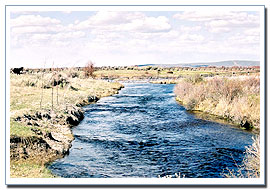
Homes being built, but a housing shortage still exists on the rez
Morgan Winsor
Taki: Hatcheries increase salmon numbersInterpretative Center will tell Sacajawea's story
Corless: Weiser Indians last to submit to 'rez' life
Boise Valley title was never extinguished
FORT HALL — Exercising tribal sovereignty in all areas will perpetuate the Shoshone-Bannock Tribes way of life for the future said Fort Hall Business Council Chairman Blaine J. Edmo. Protecting the remaining 544, 000 acres of reservation land in southeastern Idaho, of which 96 percent is tribally or individually owned is especially significant because, "You can’t have sovereignty unless you have land," Edmo said.
Water, whether potable, irrigation or recreational, both on and off reservation, treaty hunting and fishing rights, tribal culture, along with environmental protection are other important elements, he said. The Fort Hall Indian Reservation is located in southeastern Idaho that is home to both the Shoshone and Bannock tribes. The two tribes made the Fort Hall Reservation their home in 1868 when the Fort Bridger Treaty was signed with the federal government. The reservation was originally 1.8 million acres but was diminished to the current size after two land cessions — the first in 1889 when white settlers were encroaching on the southern end and the second in 1900 when the city of Pocatello was created for the railroad and its employees.
The reservation is rich with agricultural land where potatoes, wheat and alfalfa are grown. Cattle ranching is also a mainstay. Both the tribe and many individual landowners rely on farm leases for income; however Edmo said that lifestyle may be at risk because, "It’s not a good time for agriculture. In an agrarian society, when these prices are low, then the entire economy suffers both on and off the reservation," he said. So like other Idaho tribes, the Shoshone-Bannocks have also turned to gaming to help supplement the tribal budget. Sho-Ban Gaming generates around $3 to $4 million per year in net revenues and the majority goes right back into the tribal government to provide services to all reservation residents — Indian and non-Indian. Fire protection, solid waste, police and emergency medical services are some that are provided. He said the tribe recently broke ground to build a multi-purpose/bingo hall that will allow for casino expansion in the original building and tribal officials hope it’s completed by Labor Day. The tribe signed a compact for Class III gaming in 2000 with the state of Idaho (that was ratified by the State Legislature) but agreed to disagree over the legality of electronic gaming machines until it is determined in federal court. The chairman said that lawsuit is in a "discovery stage" and legal arguments were to begin in early 2003; however, the state has asked for an extension of time so it could be 2004. He said the Sho-Bans have taken no stance on the north Idaho tribes gaming initiative but if anti-gaming groups take it to court, the tribe may have to file a friend of the court brief to support the northern tribes efforts and to protect the Shoshone-Bannock Tribes interests. |
Jurisdiction has recently simmered to a boiling point (according to the local media) between the tribe and local counties. Edmo believes it’s a matter of state and county officials recognizing and abiding by the tribes procedures within the reservation boundaries that has portions of four counties within its borders. Full understanding and adherence to Public Law 280 that gave concurrent jurisdiction to both the tribe and the state is important, he said because it doesn’t give sole authority to either party. "They have to work with us and it’s not absolute jurisdiction" for the state or counties on roads maintained by their crews within reservation boundaries he continued. "This is a major issue of contention between the tribe and counties." Jeanette Wolfley, tribal attorney and tribe member, said having a viable tribal economy "is an integral part to maintaining government and provides a major source of income."
A tribally-run gas station, grocery store, arts and crafts store enhance the economy. Right-of-way agreements with utilities such as Northwest Pipeline, Williams Gas and Idaho Power also bring in revenue. Cultural vitality plays a critical role, she said. "If you lose the songs, stories and the language, it would be detrimental to the community." Edmo believes teaching the youth about tribal government is also vital. "If we don’t have examples or role models from the past (former tribal leaders,) how does one know to model his or her behavior?" Offering community education classes at night to those interested in being tribal leaders or teaching it in schools are options. Learning about the treaty, Constitution and by-laws, tribal, state and federal laws would be the curriculum.
Tribal Fish and Game Director Chad Colter said it’s important to maintain every opportunity for tribal members to exercise treaty rights. He said the tribe needs to get the state of Idaho to provide minimum water flows for fish and wildlife. "A big problem is irrigation takes all the water and there is no water for the fish," he continued. An example is the Lemhi River in central Idaho where Shoshone-Bannock exercise treaty rights. The river is 70 miles long and has 70 diversions on one stream.
There is no water for salmon and the tribes want to get water back into the stream because it is one of the main spawning grounds for salmon. "The numbers of wild fish are still declining," Colter said. "I don’t believe we will ever have self sustaining populations until we get rid of the dams." The tribe is in support of breaching the lower four dams on the Snake River. Edmo said whatever position the tribe takes on issues, it benefits non-Indians as well and "we do it all on a shoestring budget." |
|||||||||||||||||
|
||||||||||||||||||




